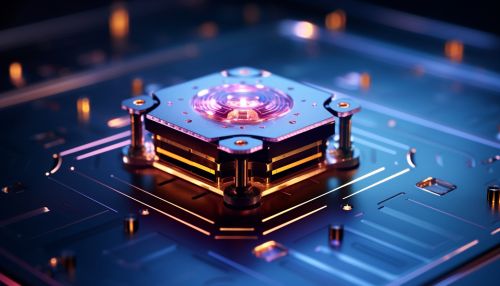Quantum Sensors
Introduction
Quantum sensors are a type of quantum technology that exploit quantum phenomena to achieve high precision measurements. These devices use the principles of quantum mechanics to improve the sensitivity and resolution of measuring physical quantities.


Quantum Phenomena in Sensing
Quantum sensors operate based on the principles of quantum mechanics, a branch of physics that describes the behavior of particles at the smallest scales. The two key quantum phenomena used in quantum sensors are quantum superposition and quantum entanglement.
Quantum Superposition
Quantum superposition is a fundamental principle of quantum mechanics that allows particles to exist in multiple states at once. This property is used in quantum sensors to achieve high precision measurements. For example, in a quantum accelerometer, superposition allows the device to measure acceleration with extreme accuracy by observing the changes in the superposition state of the quantum particles within the sensor.
Quantum Entanglement
Quantum entanglement is another key principle used in quantum sensors. When particles become entangled, the state of one particle becomes instantly connected to the state of the other, no matter the distance between them. This property is used in quantum sensors to improve measurement accuracy and sensitivity. For instance, in quantum imaging, entangled photons are used to create images with higher resolution than what can be achieved with classical imaging techniques.
Types of Quantum Sensors
There are several types of quantum sensors, each designed to measure a specific physical quantity. These include quantum accelerometers, quantum magnetometers, quantum gyroscopes, quantum clocks, and quantum imaging devices.
Quantum Accelerometers
Quantum accelerometers measure acceleration with high precision by using the principle of quantum superposition. These devices can have applications in navigation systems, where high precision acceleration measurements are required.
Quantum Magnetometers
Quantum magnetometers are devices that measure magnetic fields with high sensitivity. They operate based on the principle of quantum entanglement and can be used in various fields, such as geology, archaeology, and medicine.
Quantum Gyroscopes
Quantum gyroscopes are devices that measure rotation rates. They use the principles of quantum mechanics to achieve high precision measurements, which can be useful in navigation and positioning systems.
Quantum Clocks
Quantum clocks are timekeeping devices that use the principles of quantum mechanics to achieve high precision time measurements. They can be used in various applications, such as global positioning systems (GPS) and telecommunications.
Quantum Imaging Devices
Quantum imaging devices use the principle of quantum entanglement to create images with higher resolution than what can be achieved with classical imaging techniques. These devices can have applications in medical imaging and surveillance.
Applications of Quantum Sensors
Quantum sensors have a wide range of applications in various fields. Their high precision and sensitivity make them ideal for use in navigation systems, medical imaging, telecommunications, and more.
Quantum accelerometers and gyroscopes can be used in navigation systems to provide highly accurate positioning and orientation information. These devices can be particularly useful in environments where GPS signals are not available, such as underwater or underground.
Medical Imaging
Quantum imaging devices can be used in medical imaging to provide high-resolution images of the human body. This can help in the early detection of diseases and in guiding surgical procedures.
Telecommunications
Quantum clocks can be used in telecommunications to synchronize the timing of data transmission across large networks. This can improve the efficiency and reliability of data transmission.
Geology and Archaeology
Quantum magnetometers can be used in geology and archaeology to detect variations in the Earth's magnetic field. This can help in the detection of mineral deposits and archaeological artifacts.
Future of Quantum Sensors
The field of quantum sensors is still in its early stages, but it holds great promise for the future. As the technology matures, we can expect to see more widespread use of quantum sensors in various fields. The high precision and sensitivity of these devices could revolutionize many industries, from navigation and telecommunications to medicine and geology.
